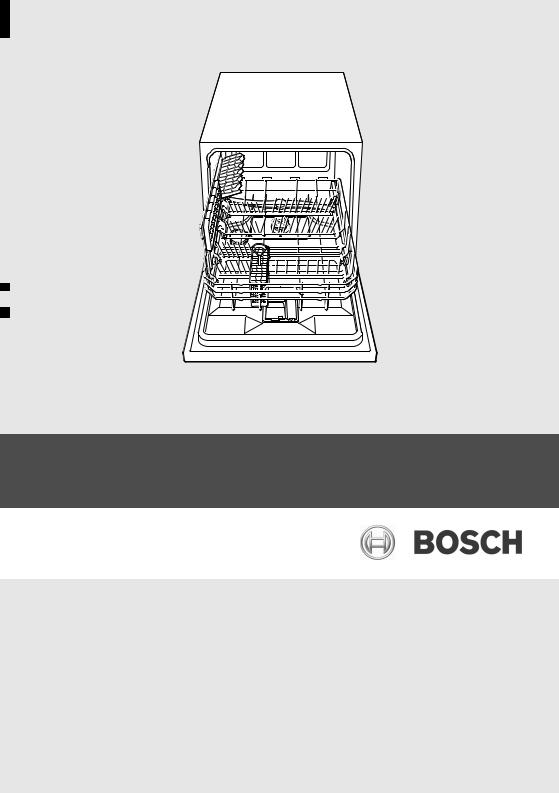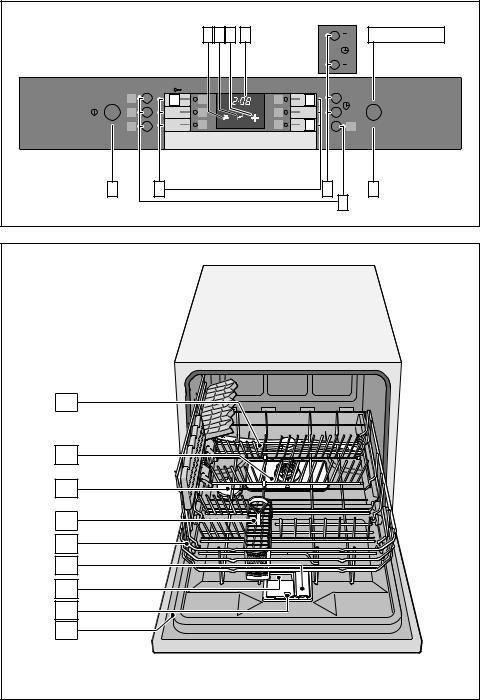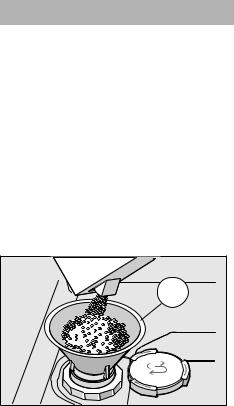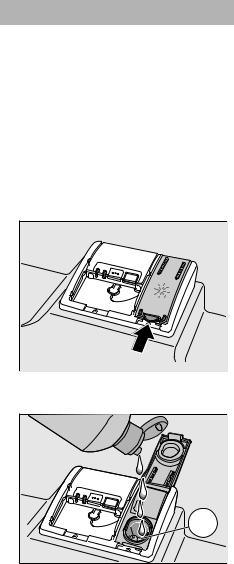Bosch SKE53M15EU, SKE63M05GB, SKE63M05EU, SKE53M25EU, SKE53M05EU Manual

Dishwasher
en |
Operating instructions |
9000440219 (8908)

6 7 8 9 |
Reset 3 sec. |
|
h. |
|
B |
h. |
min. |
A |
h. |
|
|
|
|||
|
|
|
|
|
Start |
|
|
|
|
C |
Reset 3sec |
1 |
2 |
|
|
3 |
5 |
|
|
|
|
|
4 |
20 |
|
|
|
|
|
21 |
|
|
|
|
|
22 |
|
|
|
|
|
23 |
|
|
|
|
|
24 |
|
|
|
|
|
25 |
|
|
|
|
|
26 |
|
|
|
|
|
27 |
|
|
|
|
|
28 |
|
|
|
|
|
en Table of contents
Safety instructions . . . . . . . . . . . . . . . . . 4
Delivery . . . . . . . . . . . . . . . . . . . . . . . . 4 Installation . . . . . . . . . . . . . . . . . . . . . . 4 In daily use . . . . . . . . . . . . . . . . . . . . . 4 Children in the household . . . . . . . . . . 4 Door lock . . . . . . . . . . . . . . . . . . . . . . 4 Button lock . . . . . . . . . . . . . . . . . . . . . 4 Damage . . . . . . . . . . . . . . . . . . . . . . . 5 Disposal . . . . . . . . . . . . . . . . . . . . . . . 5
Getting to know your appliance . . . . . . 5
Control panel . . . . . . . . . . . . . . . . . . . 5 Appliance interior . . . . . . . . . . . . . . . . 5
Water softening system . . . . . . . . . . . . . 6
Setting . . . . . . . . . . . . . . . . . . . . . . . . . 6 Water hardness table . . . . . . . . . . . . . 6
Special salt . . . . . . . . . . . . . . . . . . . . . . . 7
Using special salt . . . . . . . . . . . . . . . . 7 Detergents with salt component . . . . . 7 Switching off water softening system . 7
Rinse aid . . . . . . . . . . . . . . . . . . . . . . . . . 8
Setting amount of rinse aid . . . . . . . . . 8 Switching off rinse aid refill indicator . . 8
Utensils . . . . . . . . . . . . . . . . . . . . . . . . . . 9
Not suitable . . . . . . . . . . . . . . . . . . . . . 9 Glass and utensil damage . . . . . . . . . 9 Loading the dishwasher . . . . . . . . . . . 9 Unloading the dishwasher . . . . . . . . . 9 Basket . . . . . . . . . . . . . . . . . . . . . . . . . 9 Cutlery basket . . . . . . . . . . . . . . . . . . . 9 Folding spikes . . . . . . . . . . . . . . . . . 10
Detergent . . . . . . . . . . . . . . . . . . . . . . . . 10
Adding detergent . . . . . . . . . . . . . . . 11 Combination detergent . . . . . . . . . . . 11
Overview of programmes . . . . . . . . . . 12
Programme selection . . . . . . . . . . . . 12 Information about comparability tests 12
Additional options . . . . . . . . . . . . . . . . 13
Express Wash . . . . . . . . . . . . . . . . . . 13 Hygiene . . . . . . . . . . . . . . . . . . . . . . . 13 Intensive zone . . . . . . . . . . . . . . . . . . 13 Extra drying . . . . . . . . . . . . . . . . . . . . 13
Washing the dishes . . . . . . . . . . . . . . . 13
Programme data . . . . . . . . . . . . . . . . 13 Aqua sensor . . . . . . . . . . . . . . . . . . . 13 Switching on the appliance . . . . . . . . 13 Remaining running time display . . . . 13 Timer programming . . . . . . . . . . . . . . 14 End of programme . . . . . . . . . . . . . . 14 Switching off the appliance . . . . . . . . 14 Interrupting the programme . . . . . . . . 14 Terminating the programme . . . . . . . 14 Changing the programme . . . . . . . . . 14 Intensive drying . . . . . . . . . . . . . . . . . 15
Maintenance and care . . . . . . . . . . . . . 15
Overall condition of the machine . . . . 15 Special salt and rinse aid . . . . . . . . . 15 Filters . . . . . . . . . . . . . . . . . . . . . . . . . 16 Spray arm . . . . . . . . . . . . . . . . . . . . . 16 Waste water pump . . . . . . . . . . . . . . . 17
Troubleshooting . . . . . . . . . . . . . . . . . . 17
... when the appliance is switched on 17
... changing settings . . . . . . . . . . . . . . 17
... on the appliance . . . . . . . . . . . . . . 18
... during the wash cycle . . . . . . . . . . 18
... on the utensils . . . . . . . . . . . . . . . . 18
Customer service . . . . . . . . . . . . . . . . 19 Installation . . . . . . . . . . . . . . . . . . . . . . 20
Safety instructions . . . . . . . . . . . . . . . 20 Delivery . . . . . . . . . . . . . . . . . . . . . . . 20 Technical specifications . . . . . . . . . . . 20 Installation . . . . . . . . . . . . . . . . . . . . . 21 Waste-water connection . . . . . . . . . . . 21 Fresh water connection . . . . . . . . . . . 21 Electrical connection . . . . . . . . . . . . . 21 Removing the appliance . . . . . . . . . . 21 Transportation . . . . . . . . . . . . . . . . . . 22
Protection against frost (Emptying the appliance) . . . . . . . . . . . . . . . . . . . . . 22
Waste disposal . . . . . . . . . . . . . . . . . . . 22
Packaging . . . . . . . . . . . . . . . . . . . . . 22 Old appliances . . . . . . . . . . . . . . . . . 22

en
Safety instructions
Delivery
–Check the packaging and dishwasher immediately for damage caused in transit. Do not switch on a damaged appliance, but contact your supplier.
–Please dispose of the packaging material in an environmentally friendly manner.
–Do not let children play with packaging and its parts. There is a risk of suffocation from collapsible boxes and film.
Installation
Read the “Installation” chapter to learn how to install and connect the appliance correctly.
In daily use
–Use the dishwasher only in the household and only for its designed purpose: for washing domestic dishes.
–Children or people whose physical, sensory or mental abilities prevent them from using the appliance safely must not use this appliance without supervision or instruction
by a responsible person.
–Do not lean or sit on the open door. The appliance could tip.
–Please note that free-standing appliances may tip over if the baskets are overloaded.
–Do not add any solvents to the washing chamber. Danger of explosion!
–Open the door carefully when the programme is still running. There is a risk of hot water spraying out of the appliance.
–Read and observe the safety information and instructions for use on the packaging for cleaning and rinsing agents.
Ã=Warning
Knives and other utensils with sharp points must be placed in the cutlery basket with the points downwards or horizontally on the knife shelf *.
* depending on model
Children in the household
–If fitted, use the childproof lock. An exact description can be found in the back of the envelope.
–Do not allow children to play with or operate the appliance.
–Keep children away from detergents and rinse aid. These may cause chemical burns in the mouth, throat and eyes or asphyxiation.
–Keep children away from open dishwasher. The water in the rinsing compartment is not drinking water and could contain detergent residue.
Childproof lock (door lock) *
The description of the childproof lock is at the back in the envelope.
* depending on model
Childproof lock (button lock)
You can secure your appliance from being unintentionally the programme terminated (e.g. improper operation by children).
Activating the button lock:
–Start the required programme.
–Hold down the button + for approx. 4 sec. until this ’– is indicated on the digital display.
If any button is pressed while the programme is running, this ’– is indicated on the digital display. It is not possible to end (Reset) the programme.
Deactivating the button lock:
–Hold down the button + for approx. 4 sec. until the display ’– goes out.
When the programme ends (‹:‹‹ on the digital display), the button lock is cancelled. If there is a power failure, the button lock is retained. Whenever a programme is restarted, the button lock must be reactivated.
4

Damage
–The appliance may be repaired and opened up by a technician only. To do this, disconnect the appliance from the power supply. Pull out the mains plug or switch off the fuse. Turn off the tap.
Disposal
–Make redundant appliances unusable to prevent subsequent accidents.
–Dispose of the appliance in an environmentally friendly manner.
Ã=Warning
Children could become locked in the appliance (risk of suffocation) or find themselves in other dangerous situations.
Therefore: Pull out the mains plug, sever and dispose of the power cord. Destroy the door lock so that the door can no longer be closed.
en
Getting to know your appliance
Diagrams of the control panel and the interior of the appliance can be found in the envelope at the front.
Individual positions are referred to in the text.
Control panel
( ON/OFF switch
0 Programme buttons **
8 Timer programming * @ Additional options ** H START button
P Display “Check water supply” X Salt refill indicator
` Rinse aid refill indicator H Digital display
* depending on model
** Number depending on model
Appliance interior
1" Spray arm 1* Filters
12 Dispenser for special salt 1: Cutlery basket
1B Basket
1J Dispenser for rinse aid
1R Detergent dispenser
1Z Lock for detergent dispenser
1B Rating plate
5

en
Water softening system
To ensure good washing results, the dishwasher requires soft water, i.e. containing low amounts of lime, otherwise white limescale will be deposited on the utensils and inner container.
Tap water above 7° dH (from set value
•:‹‚) must be softened. The water is softened with salt (regeneration salt) in the water softening system of the dishwasher.
The setting and therefore the required amount of salt depends on the degree of hardness of your tap water (see table).
Setting
The amount of salt dispensed can be set from •:‹‹ to •:‹ˆ.
Salt is not required at the set value •:‹‹.
–Find out about the hardness value of your tap water. Your water utility company will help you with this.
–Set value can be found in the water hardness table.
–Close the door.
–Switch on ON/OFF switch (.
–Hold down programme button # and press START button H until •:‹.... is indicated on the digital display.
–Release both buttons.
The LED for button # flashes and the
digital display H displays the factory setting •:‹….
To change the setting:
–Press programme button 3.
Each time the button is pressed, the
set value increases by one level; when the value of •:‹ˆ has been reached, the display jumps back to •:‹‹ (off).
–Press START button H.
The chosen setting has now been stored.
Water hardness table
Water |
Hardness |
mmol/l |
Set value |
hardness |
range |
|
on the |
value |
|
|
machine |
°Clarke |
|
|
|
0‒8 |
soft |
0‒1.1 |
•:‹‹ |
9‒10 |
soft |
1.2‒1.4 |
•:‹‚ |
11‒12 |
medium |
1.5‒1.8 |
•:‹ƒ |
13‒15 |
medium |
1.9‒2.1 |
•:‹„ |
16‒20 |
medium |
2.2‒2.9 |
•:‹… |
21‒26 |
hard |
3.0‒3.7 |
•:‹† |
27‒38 |
hard |
3.8‒5.4 |
•:‹‡ |
39‒44 |
hard |
5.5‒6,2 |
•:‹ˆ |
6

Special salt
Using special salt
Always refill with special salt immediately before switching on the appliance. This ensures that overrun special salt solution is immediately washed out and does not corrode the rinsing tank.
–Open the screw-type cap of the compartment 12.
–Fill the tank with water (only required when switching on the appliance for the first time).
–Then add dishwasher salt (not table salt or tablets).
The water is displaced and runs out.
As soon as the salt refill indicator X on the fascia is lit, top up the salt.
* |
* depending on model
Using detergents with salt component
If combined detergents with a salt component are used, salt can usually be omitted up to a water hardness of 21° dH (37° fH, 26° Clarke, 3.7 mmol/l). If the water hardness is over 21° dH, special salt must be used.
en
Switching off salt refill indicator/ water softening system
If the salt refill indicator X is impaired (e.g. when using combined detergents containing salt component), it can be switched off.
–Proceed as described under “Adjusting
the water softening system” and set the value to •:‹‹.
The water softening system and salt refill indicator are now switched off.
Ã=Warnings
–Never fill the salt dispenser with detergent. You will destroy the water softening system.
–To prevent corrosion, always refill with salt immediately before switching on the appliance.
7

en
Rinse aid
As soon as the rinse-aid refill indicator ` is lit on the fascia, there is still a rinse-aid reserve of 1 – 2 rinsing processes. Refill with rinse aid.
The rinse aid is required for stain-free utensils and clear glasses. Use only rinse aid for domestic dishwashers.
Combined detergents with rinse-aid component may be used up to a water hardness of 21° dH (37° fH, 26° Clarke, 3.7 mmol/l) only. If the water hardness is over 21° dH, rinse aid must be used.
–Open the dispenser 1J by pressing and lifting the plate on the cover.
–Carefully pour rinse aid up to the max. mark in the filler opening.
max |
–Close cover until it clicks shut.
–To prevent excessive foam formation during the next rinse cycle, remove any rinse aid which has run over with a cloth.
Setting amount of rinse aid
The amount of rinse aid dispensed can be
set from §:‹‹ to §:‹‡. This is the factory setting §:‹….
Do not change the amount of rinse aid unless streaks (select lower setting) or water stains (select higher setting) are left on the utensils.
–Close the door.
–Switch on ON/OFF switch (.
–Hold down programme button # and press START button H until •:‹.... is indicated on the digital display.
–Release both buttons.
The LED for button # flashes and the
digital display H displays the factory setting •:‹….
–Press programme button # until the factory set value §:‹… is indicated on the digital display H.
To change the setting:
–Press programme button 3.
Each time the button is pressed, the
set value increases by one level; when the value of §:‹‡ has been reached, the display jumps back to §:‹‹ (off).
–Press START button H. The set value is saved.
Switching off rinse aid refill indicator
If the rinse-aid refill indicator ` is impaired (e.g. when using combined detergents containing rinse aid component), it can be switched off.
–Proceed as described under “Setting
amount of rinse aid” and set the value to §:‹‹.
The rinse aid refill indicator ` is now switched off.
8
